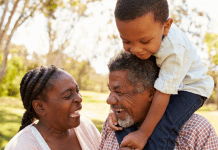One of the hardest things to do in life is to grieve. There are resources everywhere to help us navigate our grief in the form of learning about grief’s many stages, people to talk to, or hope in a higher power. Grief is, after all, a part of life and something we will all experience.

In learning about grief, we often discuss it in terms of a loss: the loss of a loved one, loss of a child, loss of a pet, a friendship, a job, a home, possessions. What happens when our hearts break before the loss happens?
In a society that values perfection and pulled-togetherness, it can feel very taboo to grieve before a loss because it can seem like we’ve given up hope or are being pessimistic. We aren’t supposed to fall apart before the appropriate time. We certainly aren’t supposed to allow our children to see us like that.
Our Bout with Grief
Several weeks ago, my father-in-law called to tell my husband that his grandmother, Gammer, had broken a hip, that it had unfortunately happened some time ago and the nursing home didn’t catch it, and that she would need to undergo surgery to mend it. My husband hung up the phone — looked at me with a sad, far away look — and said, “This will kill her.”
>> RELATED READ :: Teaching Our Kids to Lament <<
I held his hand, knowing his heart was breaking while he outwardly maintained his composure, and told him that it was okay to be sad. He told me, “It doesn’t work like that.” He wasn’t supposed to be sad yet.
The surgery wasn’t a simple task and ended up being several procedures from which she would never recover. He went to the hospital to visit, sat with family and waited for news, and listened as they expressed hope in treatments to clear up infections or help with the pain.
As the days dragged on, he became quieter, stressed, and agitated. We knew during that first call, deep down, that it was the beginning of the end for Gammer. Grief was starting to make its presence known.
 My husband’s grief, our grief as I had the pleasure of loving her for almost 17 years, began before she passed. The stages of grief came in waves during that time so that when she finally did pass, it was a different kind of sadness. We were shocked that she broke a hip, angry that it wasn’t caught, guilty that we hadn’t been to visit more despite COVID regulations making it difficult, and sad over the profound loss our entire family was about to endure. Bittersweet memories came in waves.
My husband’s grief, our grief as I had the pleasure of loving her for almost 17 years, began before she passed. The stages of grief came in waves during that time so that when she finally did pass, it was a different kind of sadness. We were shocked that she broke a hip, angry that it wasn’t caught, guilty that we hadn’t been to visit more despite COVID regulations making it difficult, and sad over the profound loss our entire family was about to endure. Bittersweet memories came in waves.
Unfortunately, the grief didn’t fix the sadness. It wasn’t time for that yet. Instead, we were short with each other, stressed over disruptions in our routine, less patient with our kids, and exhausted.

Anticipatory Grief
Since then, I learned a new term called “anticipatory grief,” or grief before the loss. Normalizing anticipatory grief doesn’t mean we are giving up on that loved one but instead allows us to experience what time we have left with him or her in a more profound way. Use the time to make sure you share your feelings, laugh and cry together — leaning into the time of fellowship with each other.
>> RELATED READ :: Guiding Children Through Grief <<
If you’re someone who needs to stay busy, use the time to channel those feelings into making decisions and arrangements, so you won’t have to worry about them later. Make sure you’re clear on your loved one’s and your family’s wishes. Seek out resources and make a plan that you can quickly execute when the time comes.
Most important, know it’s okay to be sad before a loss. It’s okay to express your grief. Showing our children or spouses that we are sad doesn’t weaken us in their eyes, but helps them learn and grow. It helps them to know that it’s okay for them to grieve before and when they experience loss.













